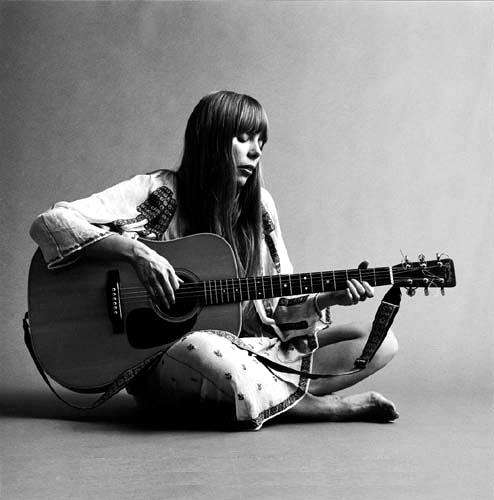Joni Mitchell

"I want the full hyphen: folk-rock-country-jazz-classical, so finally when you get all the hyphens in, maybe they'll drop them all, and get down to just some American music."
A Canadian singer, song-writer and painter, Joni Mitchell was born in 1943 in Alberta, and began singing around the age of nine, after a case of polio. To get the biographical data out of the way: she made a short attempt to go to college, leaving after a year; in 1965, she gave birth to a girl, and later married Chuck Mitchell that same year, but not long after, she gave the girl up for adoption.
Now onto the important bits. She made her breakthrough in the mid 1960s, relocating to New York City and travelling up and down the Northeast coast, playing in cafes and bars. Many of the songs she had written and sung were covered by other artists during this time, a trend that would continue as her popularity grew. Many of these covers allowed these artists to eclipse Mitchell's own career, including Judy Collins' cover of "Both Sides, Now", which became a top ten hit in 1967.
It wasn't until 1970 that she reached mainstream success, under the guidance of producer David Crosby, of Crosby, Stills, and Nash, winning Grammy Award for Best Folk Performance for her album Clouds. She continued to critical commercial success up until the 1980s, when she released more jazz-influenced songs, compared to her previous acoustic work. During this time, her work failed to reach the same success as before, Mingus being her first album not to sell at least half a million copies.
This trend continued until the 1990s, particularly after the release of the Grammy-awards CD Turbulent Indigo in 1994. This is largely thanks to a return to her original sound and playing style. Her newfound success would continue until her retirement in 2002, though she later released several new CDs since then. A memoir is also supposedly in the works.
Mitchell musical style consists of non-standard guitar tuning, elaborate orchestration (occasionally verging on Baroque Pop territory), lush vocal harmonies, and borrowing elements from various genres (rock, jazz, New Wave, folk and pop, for starters).
- Song to a Seagull (1968)
- Clouds (1969)
- Ladies of the Canyon (1970)
- Blue (1971)
- For the Roses (1972)
- Court and Spark (1974)
- Miles of Aisles (1974) (live album)
- The Hissing of Summer Lawns (1975)
- Hejira (1976)
- Don Juan's Reckless Daughter (1977)
- Mingus (1979)
- Shadows and Light (1980) (live album)
- Wild Things Run Fast (1982)
- Dog Eat Dog (1985)
- Chalk Mark in a Rain Storm (1988)
- Night Ride Home (1991)
- Turbulent Indigo (1994)
- Taming the Tiger (1998)
- Both Sides Now (2000)
- Travelogue (2002)
- Shine (2007)
- Amchitka, The 1970 Concert That Launched Greenpeace (2009) (live album)
- Amelia Earhart : "Amelia" isn't exactly about her, but Mitchell addresses it to her.
- Anti-Christmas Song : "River"
- Dual-Meaning Chorus : "Big Yellow Taxi"
- Lighter and Softer : Crosby, Stills and Nash's cover of Woodstock was quite different from her original slow, sparse work.
- Pieces of God: "Woodstock".
- One-Woman Song : "Carey". Which is weird, because it's actually about a guy.
- Orchestral Version: An entire album of these with Both Sides Now.
- Refrain From Assuming
- Signature Style: Her open or non-standard guitar tunings, which she calls "Joni's weird chords". There are almost 50 different tunings.
- Smoking Is Cool : Joni began smoking at the age of 9, and it is reportedly one reason for her voice's decline in later years.
- Stage Names: Joni's real name is Roberta Joan Anderson.
- Terra Deforming: "Big Yellow Taxi".
- Unusual Euphemism: "Blue Motel Room": "I know that you've got all those pretty girls coming 'round, hanging on your boom-boom-pachyderm"